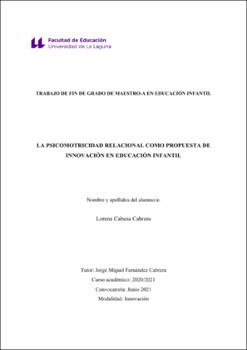La psicomotricidad relacional como propuesta de innovación en Educación Infantil.
Autor
Cabeza Cabrera, LorenaFecha
2021Resumen
Este trabajo de fin de grado (TFG) tiene como principal objetivo introducir aspectos
innovadores a la práctica docente en el segundo ciclo de Educación Infantil (3-6 años),
considerando la psicomotricidad relacional en la programación habitual de esta etapa, siguiendo
las propuestas planteadas por autores como Lapierre, Llorca y Sánchez (2015), la meta que se
persigue es optimizar el desarrollo integral del alumnado de esta edad, respetando las fases
evolutivas y sus ritmos de aprendizaje. Además, se pretende trabajar desde una perspectiva
globalizadora, que entiende al niño como un ser global en todos los aspectos: afectivo, cognitivo
y motriz. Partiendo de esta base, este proyecto apuesta por utilizar la psicomotricidad relacional
como metodología para trabajar los diferentes contenidos de la etapa, a través del juego y la
experimentación, para lograr un aprendizaje significativo. The main objective of this final degree project (TFG) is to introduce innovative aspects to
teaching practice in the second cycle of Early Childhood Education (3-6 years), considering
relational psychomotor skills in the usual programming of this stage, following the proposed
proposals by authors such as Lapierre, Llorca and Sánchez (2015), the goal is to optimize the
integral development of students of this age, respecting the evolutionary phases and their
learning rhythms. In addition, it is intended to work from a global perspective, which
understands the child as a global being in all aspects: affective, cognitive and motor. Starting
from this base, this project is committed to using relational motor skills as a methodology to
work on the different contents of the stage, through games and experimentation, to achieve
meaningful learning.





